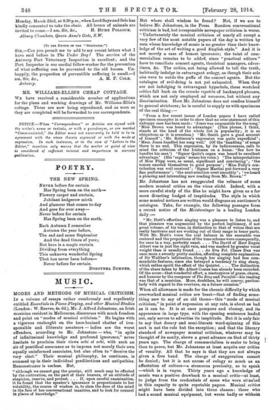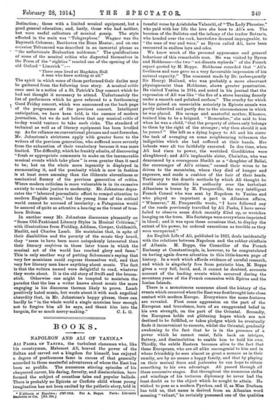NU S IC.
MODES AND METHODS OF MUSICAL CRITICISM. IN a volume of essays rather cumbrously and repellently entitled Essentials in Piano.Elaying, and other Musical Studies (London : W. Reeves, 4e. 6d.), Mr. J. Alfred Johnstone, an Irish musician resident in Melbourne, discourses with much freedom and point on "modes of musical criticism." He begins with a vigorous onslaught on the bare-brained chatter of irre- sponsible and illiterate amateurs — ladies are the worst offenders, according to Mr. Johnstone — who, "in spite of infinitesimal knowledge and profound ignorance," never hesitate to proclaim their views urbi of orbi, with such an air of pontifical assurance as to impress not merely their own equally uninformed associates, but also often to " deceive the very elect." Their musical philosophy, he continues, is summed up in their individual predilections and antipathies. Remonstrance is useless. But,
"although we cannot gag the gossips, still much may be effected by the cultivation, on the part of their hearers, of an attitude of suspicion, reserve, and protest.. . . If , upon careful examination, it be found that the speaker's ignorance is proportionate to her volubility, the course of wisdom is, to slam the door of the mind in the face of her conversational inanities, and to look for counsel in places of knowledge." But where shall wisdom be found ? Not, if we are to believe Mr. Johnstone, in the Press. Random conversational criticism is bad, but irresponsible newspaper criticism is worse. " Unfortunately the musical criticism of nearly all except a very few of the most notable papers of the day is written by men whose knowledge of music is no greater than their know- ledge of the art of writing a good English style." And it is not merely a case of honest ignorance; the taint of com- mercialism remains to be added, since "practical editors" have to conciliate concert agents, theatrical managers, adver- tisers, &c. The critics, not being allowed to tell the truth, habitually indulge in extravagant eulogy, as though their sole aim were to outdo the puffs of the concert agents. But the catalogue of evil-doing is not yet exhausted. When they are not indulging in extravagant hyperbole, these wretched critics fall back on the eratnbe repetita of hackneyed phrases, which are not only employed ad nauseate, but without any discrimination. Here Mr. Johnstone does not confine himself to general strictures; he is careful to supply us with specimens of the real thing — "From a few recent issues of London papers I have culled specimen examples in order to show that no over-statement of this unhappy case has been made: `Jones was responsible for the song,' Miss Brown was heard to advantage.' (This phrase, I think, stands at the head of the whole list in popularity ; it is as ubiquitous as it is senseless.) ' Mr. Smith gave a good account of himself '; 'Mr. Robinson'. expression was quite superficial' ; 'Mme. Jones handled her song well.' (Of the `handling' of songs there is no end. This expression, by its ludicrousness, calls to mind the criticism of the Irishman on a horse: • See how he handles his earn') ` Signor Quito's organ was heard to excellent advantage.' (His 'organ' means his voice.) The interpretations of Miss Flipp were, as usual, significant and convincing ; 'the tenors exerted themselves to good purpose'; 'Miss Folly's con- tribution was well received' ; Signor Martini put forward a very fine performance' ; ` the next selection went smoothly ' ; ' we heard a pleasing and interesting new reading from Mr. Brown: " Mr. Johnstone has not exaggerated the reliance of some modern musical critics on the t7 iCUX cliche. Indeed, with a more careful study of the files he might have given us a far more diverting budget of ineptitudes. The style in which some musical notices are written would disgrace an auctioneer's catalogue. Take, for example, the following passages from a recent notice of the Meistersinger in a leading London daily :— " Mr. Hutt's effortless singing was a pleasure to listen to, and that pleasure was augmented by the perfect legitimacy, if not great volume, of his tone, in distinction to that of voices that are really baritones and are working out of their range in tenor parts. With Mr. Hat's voice the real balance in the ensemble was restored and the proportions of the tone scheme were consequently, for once in a way, perfectly exact. . . The David of Herr Eugen Albert was in just the right vein, and was marked by greater vocal weight than is usually found. . . As Eva Fri. Claire Dux was once more a sweetly pretty maiden, affording complete explanation of Sir Walther's infatuation, though her singing had less com- mendable features, since she betrayed a tendency to sing sharp, which rather spoilt the effect of the Quintet. . . . The distinction of the share taken by Mr. Albert Coates has already been recorded. Of the score—that wonderful effort, a masterpiece of grace, charm, and humour by the composer of The Ring and Parsif al—his reading was that of a musician. More, doubtless, he will convey, particu- larly with regard to the overture, on a future occasion."
When all allowance is made for the chronic difficulty by which overworked musical critics are beset—that of finding some- thing new to say of an old theme—this "mode of musical criticism," in point of expression at any rate, is about as bad as it can be. It is at once pompous and clumsy, and its appearance in large type, with the opening sentences leaded out, only serves to advertise its ineptitude. But it is only fair to say that dreary and semi-literate word-spinning of this sort is not the rule but the exception; and that the literary standard of newspaper musical criticism, whatever may be thought of its sanity, shows a great advance on that of thirty years ago. The charge of commercialism is easier to bring than to prove, but Mr. Johnstone at least acquits our critics of venality. All that he says is that they are not always given a free hand. The charge of exaggeration cannot be denied; but it is not excess of eulogy so much as an affeotation of culture—a strenuous preciosity, so to speak —which is in vogue. Thirty years ago a knowledge of music was a positive drawback to a musical critic—at leaat, to judge from the credentials of some who were attached in this capacity to quite reputable papers. Musical critics might have been divided into three classes : those who had a sound musical equipment, but wrote badly or withoht 3istinetion; those with a limited musical equipment, but a good general education; and, lastly, those who bad neither, but were useful collectors of musical gossip. The style affected in the main was " Telegrapliese.' Wagner was the Bayreuth Colossus; Beethoven the Bonn Master; and on one occasion Telramund was described in an immortal phrase as "the unfortunate Brabantian nobleman." The qualifications of some of the musical critics who disported themselves in the Press of the "eighties " remind one of the opening of the old Oxford " Limerick " " There once lived at Magdalen Hall A man who knew nothing at all."
The spirit in which some of them performed their duties may be gathered from the following true story. A musical critic once sent in a notice of a St. Patrick's Day concert which be had not thought it necessary to attend. Unfortunately the list of performers which be gore referred to a forthcoming Good Friday concert, which was announced on the back page of the programme of the previous concert. Intelligent anticipation, we have been told, is the essence of modern journalism, but we do not believe that any musical critic of to-day would venture to take such risks. The standard of technical as well as of literary equipment has been levelled up. As for reliance on conventional phrases and cant formulae, Mr. Johnstone's strictures apply with greater force to the writers of the previous generation, who suffered more severely from the exhaustion of their vocabulary because it was more limited. The difficulty, which he frankly admits, of discovering "fresh or appropriate comments to make on the innumerable musical events which take place" is even greater than it used to be; but on the whole more ingenuity is displayed in surmounting it, and the preciosity which is now in fashion is at least more amusing than the illiterate slovenliness or mechanical fluency of the previous generation of critics. Where modern criticism is more vulnerable is in its excessive anxiety to render justice to modernity. Mr. Johnstone depre- cates the "laboured journalistic effort to compel attention to modern English music," but the young lions of the critical world cannot be accused of insularity; a Patagonian would be assured of quite as attentive a hearing as the truest of true- born Britons.
In another essay Mr. Johnstone discourses pleasantly on "Some Old-Fashioned Literary Styles in Musical Criticism," with illustrations from Fielding, Addison, Cowper, Goldsmith, Hazlitt, and Charles Lamb. He maintains that, in spite of their disabilities and the poverty of the music they heard, they "seem to have been more outspokenly interested than their literary confreres in those later times in which the musical art of the world has reached glory and fame." This is only another way of putting Sctumann's saying that very few musicians could express themselves well, and that very few literary men knew anything about music. The fact is that the writers named were delightful to read, whatever they wrote about. It is the old story of Swift and the broom- stick. Otherwise one might be tempted to maintain the paradox that the less a writer knows about music the more engaging is his discourse thereon likely to prove. Lamb positively hated music, but wrote about it with such angelical absurdity that, in Mr. Johnstone's happy phrase, there can hardly be " in the whole world a single musician boor enough not to forgive him all he says, and thank him into the
bargain, for so much merry-making." C. L. G.















































 Previous page
Previous page